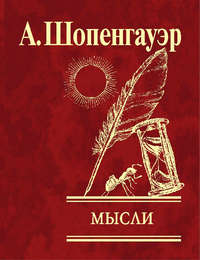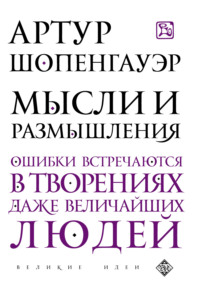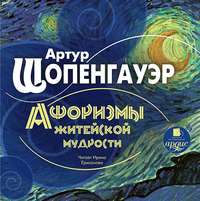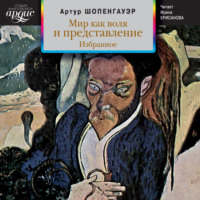 полная версия
полная версияThe World as Will and Idea (Vol. 3 of 3)
What is opposed to this specially Christian view is everywhere and always merely the Old Testament, with its παντα καλα λιαν. This appears with peculiar distinctness from that important third book of the Stromata of Clement, where, arguing against the encratistic heretics mentioned above, he constantly opposes to them only Judaism, with its optimistic history of creation, with which the world-denying tendency of the New Testament is certainly in contradiction. But the connection of the New Testament with the Old is at bottom only external, accidental, and forced; and the one point at which Christian doctrine can link itself on to the latter is only to be found, as has been said, in the story of the fall, which, moreover, stands quite isolated in the Old Testament, and is made no further use of. But, in accordance with the account in the Gospels, it is just the orthodox adherents of the Old Testament who bring about the crucifixion of the founder of Christianity, because they find his teaching in conflict with their own. In the said third book of the Stromata of Clement the antagonism between optimism with theism on the one hand, and pessimism with ascetic morality on the other, comes out with surprising distinctness. This book is directed against the Gnostics, who just taught pessimism and asceticism, that is, εγκρατεια (abstinence of every kind, but especially from all sexual satisfaction); on account of which Clement censures them vigorously. But, at the same time, it becomes apparent that even the spirit of the Old Testament stands in this antagonism with that of the New Testament. For, apart from the fall, which appears in the Old Testament like a hors d'œuvre, the spirit of the Old Testament is diametrically opposed to that of the New Testament – the former optimistic, the latter pessimistic. Clement himself brings this contradiction out prominently at the end of the eleventh chapter (προσαποτεινομενον τον Παυλον τῳ Κριστῃ κ.τ.λ.), although he will not allow that it is a real contradiction, but explains it as only apparent, – like a good Jew, as he is. In general it is interesting to see how with Clement the New and the Old Testament get mixed up together; and he strives to reconcile them, yet for the most part drives out the New Testament with the Old. Just at the beginning of the third chapter he objects to the Marcionites that they find fault with the creation, after the example of Plato and Pythagoras; for Marcion teaches that nature is bad, made out of bad materials (φυσις κακη, εκ τε ὑλης κακης); therefore one ought not to people this world, but to abstain from marriage (μη βουλομενοι τον κοσμον συμπληρουν, απεχεσθαι γαμου). Now Clement, to whom in general the Old Testament is much more congenial and convincing than the New, takes this very much amiss. He sees in it their flagrant ingratitude to and enmity and rebellion against him who has made the world, the just demiurgus, whose work they themselves are, and yet despise the use of his creatures, in impious rebellion “forsaking the natural opinion” (αντιτασσομενοι τῳ ποιητῃ τῳ σφων, … εγκρατεις τῃ προς τον πεποιηκοτα εχθρᾳ, μη βουλομενοι χρησθαι τοις ὑπ᾽ αυτου κτισθεισιν, … ασεβει θεομαχιᾳ των κατα φυσιν εκσταντες λογισμωι). At the same time, in his holy zeal, he will not allow the Marcionites even the honour of originality, but, armed with his well-known erudition, he brings it against them, and supports his case with the most beautiful quotations, that even the ancient philosophers, that Heraclitus and Empedocles, Pythagoras and Plato, Orpheus and Pindar, Herodotus and Euripides, and also the Sibyls, lamented deeply the wretched nature of the world, thus taught pessimism. Now in this learned enthusiasm he does not observe that in this way he is just giving the Marcionites water for their mill, for he shows that
“All the wisest of all the ages”
have taught and sung what they do, but confidently and boldly he quotes the most decided and energetic utterances of the ancients in this sense. Certainly they cannot lead him astray. Wise men may mourn the sadness of existence, poets may pour out the most affecting lamentations about it, nature and experience may cry out as loudly as they will against optimism, – all this does not touch our Church Father: he holds his Jewish revelation in his hand, and remains confident. The demiurgus made the world. From this it is a priori certain that it is excellent, and it may look as it likes. The same thing then takes place with regard to the second point, the εγκρατεια, through which, according to his view, the Marcionites show their ingratitude towards the demiurgus (αχαρισειν τῳ δημιουργῳ) and the perversity with which they put from them all his gifts (δἰ αντιταξιν προς τον δημιουργον, την χρησιν των κοσμικων παραιτουμενοι). Here now the tragic poets have preceded the Encratites (to the prejudice of their originality) and have said the same things. For since they also lament the infinite misery of existence, they have added that it is better to bring no children into such a world; which he now again supports with the most beautiful passages, and, at the same time, accuses the Pythagoreans of having renounced sexual pleasure on this ground. But all this touches him not; he sticks to his principle that all these sin against the demiurgus, in that they teach that one ought not to marry, ought not to beget children, ought not to bring new miserable beings into the world, ought not to provide new food for death (δἰ εγκρατειας ασεβουσι εις τε την κτισιν και τον ἁγιον δημιουργον, τον παντοκρατορα μονον θεον, και διδασκουσι, μη δειν παραδεχεσθαι γαμον και παιδοποιϊαν, μηδε αντεισαγειν τῳ κοσμῳ δυστυχησοντας ἑτερους, μηδε επιχορηγειν θανατῳ τροφην – c. 6). Since the learned Church Father thus denounces εγκρατεια, he seems to have had no presentiment that just after his time the celibacy of the Christian priesthood would be more and more introduced, and finally, in the eleventh century, raised to the position of a law, because it is in keeping with the spirit of the New Testament. It is just this spirit which the Gnostics have grasped more profoundly and understood better than our Church Father, who is more Jew than Christian. The conception of the Gnostics comes out very clearly at the beginning of the ninth chapter, where the following passage is quoted from the Gospel of the Egyptians: Αυτος ειπεν ὁ Σωτηρ, “ηλθον καταλυσαι τα εργα της θηλειας;” θηλειας μεν, της επιθυμιας; εργα δε, γενεσιν και φθοραν (Ajunt enim dixisse Servatorem: veni ad dissolvendum opera feminæ; feminæ quidem, cupiditatis; opera autem, generationem et interitum); but quite specially at the end of the thirteenth and the beginning of the fourteenth chapter. The Church certainly was obliged to consider how to set a religion upon its legs that could also walk and stand in the world as it is, and among men; therefore it declared these persons to be heretics. At the conclusion of the seventh chapter our Church Father opposes Indian asceticism, as bad, to Christian Judaism; whereby the fundamental difference of the spirit of the two religions is clearly brought out. In Judaism and Christianity everything runs back to obedience or disobedience to the command of God: ὑπακοη και παρακοη; as befits us creatures, ἡμιν, τοις πεπλασμενοις ὑπο της του Παντοκρατορος βουλησεως (nobis, qui Omnipotentis voluntate efficti sumus), chap. 14. Then comes, as a second duty, λατρευειν θεῳ ζωντι, to serve God, extol His works, and overflow with thankfulness. Certainly the matter has a very different aspect in Brahmanism and Buddhism, for in the latter all improvement and conversion, and the only deliverance we can hope for from this world of suffering, this Sansara, proceeds from the knowledge of the four fundamental truths: (1) dolor; (2) doloris ortus; (3) doloris interitus; (4) octopartita via ad doloris sedationem (Dammapadam, ed. Fausböll, p. 35 et 347). The explanation of these four truths will be found in Bournouf, “Introduct. à l'hist. du Buddhisme,” p. 629, and in all expositions of Buddhism.
In truth, Judaism, with its παντα καλα λιαν, is not related to Christianity as regards its spirit and ethical tendency, but Brahmanism and Buddhism are. But the spirit and ethical tendency are what is essential in a religion, not the myths in which these are clothed. I therefore cannot give up the belief that the doctrines of Christianity can in some way be derived from these primitive religions. I have pointed out some traces of this in the second volume of the Parerga, § 179 (second edition, § 180). I have to add to these that Epiphanias (Hæretic. xviii.) relates that the first Jewish Christians of Jerusalem, who called themselves Nazarenes, refrained from all animal food. On account of this origin (or, at least, this agreement) Christianity belongs to the ancient, true and sublime faith of mankind, which is opposed to the false, shallow, and injurious optimism which exhibits itself in Greek paganism, Judaism, and Islamism. The Zend religion holds to a certain extent the mean, because it has opposed to Ormuzd a pessimistic counterpoise in Ahriman. From this Zend religion the Jewish religion proceeded, as J.G. Rhode has thoroughly proved in his book, “Die heilige Sage des Zendvolks;” from Ormuzd has come Jehovah, and from Ahriman, Satan, who, however, plays only a very subordinate rôle in Judaism, indeed almost entirely disappears, whereby then optimism gains the upper hand, and there only remains the myth of the fall as a pessimistic element, which certainly (as the fable of Meschia and Meschiane) is derived from the Zend-Avesta. Yet even this falls into oblivion, till it is again taken up by Christianity along with Satan. Ormuzd himself, however, is derived from Brahmanism, although from a lower region of it; he is no other than Indra, that subordinate god of the firmament and the atmosphere, who is represented as frequently in rivalry with men. This has been very clearly shown by J.J. Schmidt in his work on the relation of the Gnostic-theosophic doctrines to the religions of the East. This Indra-Ormuzd-Jehovah had afterwards to pass over into Christianity, because this religion arose in Judæa. But on account of the cosmopolitan character of Christianity he laid aside his own name to be denoted in the language of each converted nation by the appellation of the superhuman beings he supplanted, as, Δεος, Deus, which comes from the Sanscrit Deva (from which also devil comes), or among the Gothico-Germanic peoples by the word God, Gott, which comes from Odin, Wodan, Guodan, Godan. In the same way he assumed in Islamism, which also sprang from Judaism, the name of Allah, which also existed earlier in Arabia. Analogous to this, the gods of the Greek Olympus, when in prehistoric times they were transplanted to Italy, also assumed the names of the previously reigning gods: hence among the Romans Zeus is called Jupiter, Hera Juno, Hermes Mercury, &c. In China the first difficulty of the missionaries arose from the fact that the Chinese language has no appellation of the kind and also no word for creating; for the three religions of China know no gods either in the plural or in the singular.52
However the rest may be, that παντα καλα λιαν of the Old Testament is really foreign to true Christianity; for in the New Testament the world is always spoken of as something to which one does not belong, which one does not love, nay, whose lord is the devil.53 This agrees with the ascetic spirit of the denial of one's self and the overcoming of the world which, just like the boundless love of one's neighbour, even of one's enemy, is the fundamental characteristic which Christianity has in common with Brahmanism and Buddhism, and which proves their relationship. There is nothing in which one has to distinguish the kernel so carefully from the shell as in Christianity. Just because I prize this kernel highly I sometimes treat the shell with little ceremony; it is, however, thicker than is generally supposed. Protestantism, since it has eliminated asceticism and its central point, the meritoriousness of celibacy, has already given up the inmost kernel of Christianity, and so far is to be regarded as a falling away from it. This has become apparent in our own day by the gradual transition of Protestantism into shallow rationalism, this modern Pelagianism, which ultimately degenerates into the doctrine of a loving father, who has made the world, in order that things may go on very pleasantly in it (in which case, then, he must certainly have failed), and who, if one only conforms to his will in certain respects, will also afterwards provide a still more beautiful world (with regard to which it is only a pity that it has such a fatal entrance). That may be a good religion for comfortable, married, and enlightened Protestant pastors; but it is no Christianity. Christianity is the doctrine of the deep guilt of the human race through its existence alone, and the longing of the heart for deliverance from it, which, however, can only be attained by the greatest sacrifices and by the denial of one's own self, thus by an entire reversal of human nature. Luther may have been perfectly right from the practical point of view, i. e., with reference to the Church scandal of his time, which he wished to remove, but not so from the theoretical point of view. The more sublime a doctrine is, the more it is exposed to abuse at the hands of human nature, which, on the whole, is of a low and evil disposition: hence the abuses of Catholicism are so much more numerous and so much greater than those of Protestantism. Thus, for example, monasticism, that methodical denial of the will practised in common for the sake of mutual encouragement, is an institution of a sublime description, which, however, for this very reason is for the most part untrue to its spirit. The shocking abuses of the Church excited in the honest mind of Luther a lofty indignation. But in consequence of this he was led to desire to limit as much as possible the claims of Christianity itself, and for this end he first confined it to the words of the Bible; but then, in his well-meant zeal, he went too far, for he attacked the very heart of Christianity in the ascetic principle. For after the withdrawal of the ascetic principle, the optimistic principle soon necessarily took its place. But in religions, as in philosophy, optimism is a fundamental error which obstructs the path of all truth. From all this it seems to me that Catholicism is a shamefully abused, but Protestantism a degenerate Christianity; thus, that Christianity in general has met the fate which befalls all that is noble, sublime, and great whenever it has to dwell among men.
However, even in the very lap of Protestantism, the essentially ascetic and encratistic spirit of Christianity has made way for itself; and in this case it has appeared in a phenomenon which perhaps has never before been equalled in magnitude and definiteness, the highly remarkable sect of the Shakers, in North America, founded by an Englishwoman, Anne Lee, in 1774. The adherents of this sect have already increased to 6000, who are divided into fifteen communities, and inhabit a number of villages in the states of New York and Kentucky, especially in the district of New Lebanon, near Nassau village. The fundamental characteristic of their religious rule of life is celibacy and entire abstention from all sexual satisfaction. It is unanimously admitted, even by the English and Americans who visit them, and who laugh and jeer at them in every other respect, that this rule is strictly and with perfect honesty observed; although brothers and sisters sometimes even occupy the same house, eat at the same table, nay, dance together in the religious services in church. For whoever has made that hardest of all sacrifices may dance before the Lord; he is a victor, he has overcome. Their singing in church consists in general of cheerful, and partly even of merry, songs. The church-dance, also, which follows the sermon is accompanied by the singing of the rest. It is a lively dance, performed in measured time, and concludes with a galop, which is carried on till the dancers are exhausted. Between each dance one of their teachers cries aloud, “Think, that ye rejoice before the Lord for having slain your flesh; for this is here the only use we make of our refractory limbs.” To celibacy most of the other conditions link themselves on of themselves. There are no families, and therefore there is no private property, but community of goods. All are clothed alike, in Quaker fashion, and with great neatness. They are industrious and diligent: idleness is not endured. They have also the enviable rule that they are to avoid all unnecessary noise, such as shouting, door-slamming, whip-cracking, loud knocking, &c. Their rule of life has been thus expressed by one of them: “Lead a life of innocence and purity, love your neighbours as yourself, live at peace with all men, and refrain from war, blood-shed, and all violence against others, as well as from all striving after worldly honour and distinction. Give to each his own, and follow after holiness, without which no man can see the Lord. Do good to all so far as your opportunity and your power extends.” They persuade no one to join them, but test those who present themselves by a novitiate of several years. Moreover, every one is free to leave them; very rarely is any one expelled for misconduct. Adopted children are carefully educated, and only when they are grown up do they voluntarily join the sect. It is said that in the controversies of their ministers with Anglican clergy the latter generally come off the worse, for the arguments consist of passages from the New Testament. Fuller accounts of them will be found particularly in Maxwell's “Run through the United States,” 1841; also in Benedict's “History of all Religions,” 1830; also in the Times, November 4, 1837, and in the German magazine Columbus, May number, 1831. A German sect in America, very similar to them, who also live in strict celibacy and continence, are the Rappists. An account of them is given in F. Loher's “Geschichte und Zustande der Deutschen in Amerika,” 1853. In Russia also the Raskolniks are a similar sect. The Gichtelians live also in strict chastity. But among the ancient Jews we already find a prototype of all these sects, the Essenes, of whom even Pliny gives an account (Hist. Nat., v. 15), and who resembled the Shakers very much, not only in celibacy, but also in other respects; for example, in dancing during divine service, which leads to the opinion that the founder of the Shakers took the Essenes as a pattern. In the presence of such facts as these how does Luther's assertion look: “Ubi natura, quemadmodum a Deo nobis insita est, fertur ac rapitur, fieri nullo modo potest, ut extra matrimonium caste vivatur”? (Catech. maj.)
Although Christianity, in essential respects, taught only what all Asia knew long before, and even better, yet for Europe it was a new and great revelation, in consequence of which the spiritual tendency of the European nations was therefore entirely transformed. For it disclosed to them the metaphysical significance of existence, and therefore taught them to look away from the narrow, paltry, ephemeral life of earth, and to regard it no longer as an end in itself, but as a condition of suffering, guilt, trial, conflict, and purification, out of which, by means of moral achievements, difficult renunciation, and denial of oneself, one may rise to a better existence, which is inconceivable by us. It taught the great truth of the assertion and denial of the will to live in the clothing of allegory by saying that through Adam's fall the curse has come upon all, sin has come into the world, and guilt is inherited by all; but that, on the other hand, through the sacrificial death of Jesus all are reconciled, the world saved, guilt abolished, and justice satisfied. In order, however, to understand the truth itself that is contained in this myth one must not regard men simply in time, as beings independent of each other, but must comprehend the (Platonic) Idea of man, which is related to the series of men, as eternity in itself is related to eternity drawn out as time; hence the eternal Idea man extended in time to the series of men through the connecting bond of generation appears again in time as a whole. If now we keep the Idea of man in view, we see that Adam's fall represents the finite, animal, sinful nature of man, in respect of which he is a finite being, exposed to sin, suffering, and death. On the other hand, the life, teaching, and death of Jesus Christ represent the eternal, supernatural side, the freedom, the salvation of man. Now every man, as such and potentiâ, is both Adam and Jesus, according as he comprehends himself, and his will thereupon determines him; in consequence of which he is then condemned and given over to death, or saved and attains to eternal life. Now these truths, both in their allegorical and in their real acceptation, were completely new as far as Greeks and Romans were concerned, who were still entirely absorbed in life, and did not seriously look beyond it. Let whoever doubts this see how Cicero (Pro Cluentio, c. 61) and Sallust (Catil., c. 47) speak of the state after death. The ancients, although far advanced in almost everything else, remained children with regard to the chief concern, and were surpassed in this even by the Druids, who at least taught metempsychosis. That one or two philosophers, like Pythagoras and Plato, thought otherwise alters nothing as regards the whole.
That great fundamental truth, then, which is contained in Christianity, as in Brahmanism and Buddhism, the need of deliverance from an existence which is given up to suffering and death, and the attainableness of this by the denial of the will, thus by a decided opposition to nature, is beyond all comparison the most important truth there can be; but, at the same time, it is entirely opposed to the natural tendency of the human race, and in its true grounds it is difficult to comprehend; as indeed all that can only be thought generally and in the abstract is inaccessible to the great majority of men. Therefore for these men there was everywhere required, in order to bring that great truth within the sphere of its practical application, a mythical vehicle for it, as it were a receptacle, without which it would be lost and dissipated. The truth had therefore everywhere to borrow the garb of the fable, and also constantly to endeavour to connect itself with what in each case was historically given, already familiar, and already revered. What sensu proprio remained inaccessible to the great mass of mankind of all ages and lands, with their low tone of mind, their intellectual stupidity and general brutality, had, for practical purposes, to be brought home to them sensu allegorico, in order to become their guiding star. So, then, the religions mentioned above are to be regarded as the sacred vessels in which the great truth, known and expressed for several thousand years, indeed perhaps since the beginning of the human race, which yet in itself, for the great mass of mankind always remains a mystery, is, according to the measure of their powers, made accessible to them, preserved and transmitted through the centuries. Yet, because all that does not through and through consist of the imperishable material of pure truth is subject to destruction, whenever this fate befalls such a vessel, through contact with a heterogeneous age, its sacred content must in some way be saved and preserved for mankind by another. But it is the task of philosophy, since it is one with pure truth, to present that content pure and unmixed, thus merely in abstract conceptions, and consequently without that vehicle, for those who are capable of thinking, who are always an exceedingly small number. It is therefore related to religions as a straight line to several curves running near it: for it expresses sensu proprio, thus reaches directly, what they show in veiled forms and reach by circuitous routes.
If now, in order to illustrate what has just been said by an example, and also to follow a philosophical fashion of my time, I should wish perhaps to attempt to solve the profoundest mystery of Christianity, that of the Trinity, in the fundamental conception of my philosophy, this could be done, with the licence permitted in such interpretations, in the following manner. The Holy Ghost is the distinct denial of the will to live: the man in whom this exhibits itself in concreto is the Son; He is identical with the will which asserts life, and thereby produces the phenomenon of this perceptible world, i. e., with the Father, because the assertion and denial are opposite acts of the same will whose capability for both is the only true freedom. However, this is to be regarded as a mere lusus ingenii.











